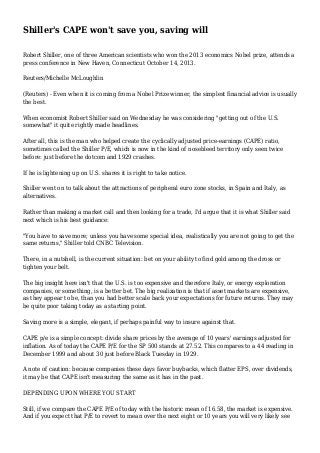
Shiller's CAPE won't save you, saving will
- 1. Shiller's CAPE won't save you, saving will Robert Shiller, one of three American scientists who won the 2013 economics Nobel prize, attends a press conference in New Haven, Connecticut October 14, 2013. Reuters/Michelle McLoughlin (Reuters) - Even when it is coming from a Nobel Prize winner, the simplest financial advice is usually the best. When economist Robert Shiller said on Wednesday he was considering "getting out of the U.S. somewhat" it quite rightly made headlines. After all, this is the man who helped create the cyclically adjusted price-earnings (CAPE) ratio, sometimes called the Shiller P/E, which is now in the kind of nosebleed territory only seen twice before: just before the dotcom and 1929 crashes. If he is lightening up on U.S. shares it is right to take notice. Shiller went on to talk about the attractions of peripheral euro zone stocks, in Spain and Italy, as alternatives. Rather than making a market call and then looking for a trade, I'd argue that it is what Shiller said next which is his best guidance: "You have to save more; unless you have some special idea, realistically you are not going to get the same returns," Shiller told CNBC Television. There, in a nutshell, is the current situation: bet on your ability to find gold among the dross or tighten your belt. The big insight here isn't that the U.S. is too expensive and therefore Italy, or energy exploration companies, or something, is a better bet. The big realization is that if asset markets are expensive, as they appear to be, than you had better scale back your expectations for future returns. They may be quite poor taking today as a starting point. Saving more is a simple, elegant, if perhaps painful way to insure against that. CAPE p/e is a simple concept: divide share prices by the average of 10 years' earnings adjusted for inflation. As of today the CAPE P/E for the SP 500 stands at 27.52. This compares to a 44 reading in December 1999 and about 30 just before Black Tuesday in 1929. A note of caution: because companies these days favor buybacks, which flatter EPS, over dividends, it may be that CAPE isn't measuring the same as it has in the past. DEPENDING UPON WHERE YOU START Still, if we compare the CAPE P/E of today with the historic mean of 16.58, the market is expensive. And if you expect that P/E to revert to mean over the next eight or 10 years you will very likely see
- 2. average annual returns in the very low single digits. May not happen, but worth insuring against. The correlation between stock valuation and future returns over the short term is low, only about 20 percent over one year, according to calculations from fund manager GMO. Over 10 years, however, the correlation is 60 percent. And where you start out has a huge impact. In a 2014 study (gmo.com/) Ben Inker and Martin Tarlie of GMO consider the plight of a worker who turned 55 in 1965, at which point she was on target for retirement savings. "The worker, however, had the misfortune of being in peak savings years during a period in which equity valuations were high and real bond yields were low. The period from the mid-1960s through the 1970s represents some of the worst real returns for both stocks and bonds on record." Inker and Tarlie write. High equity valuations and low yields. Sound familiar? The result: if our worker takes a 5 percent yearly payout in retirement she will most likely be broke by 1992, at age 82. While Inker and Tarlie argue for dynamic allocation taking into account valuation, which may well be useful, saving more has some great advantages as a strategy in current circumstances. The thing about investment strategies is that they all employ the time value of money, meaning that the most important gains come down the line from compounding. That's true, but those gains are speculative, in that we never know ahead of time what our actual experience will be. A dollar saved today, however, has a realness and solidity not enjoyed by prospective returns tomorrow. Unless you go in for Ponzi schemes you can be sure that all of the money you save today will improve your situation in the future. The same cannot be said for strategies, no matter how clever. It seems to follow then that the more uncertain you are about future returns the more you should save. The very high CAPE P/E is a source of uncertainty. Things may well be different this time. Equities may well have a great next decade. Perhaps not. Saving, as Shiller recommends, is probably your best hedge. (At the time of publication James Saft did not own any directinvestments in securities mentioned in this article. He may bean owner indirectly as an investor in a fund. You can email himat jamessaft@jamessaft.com and find more columns at blogs.reuters.com/james-saft) (James Saft is a Reuters columnist. The opinions expressed are his own.) (Editing by James Dalgleish) http://www.reuters.com/article/2015/02/18/us-saft-on-wealth-idUSKBN0LM27W20150218